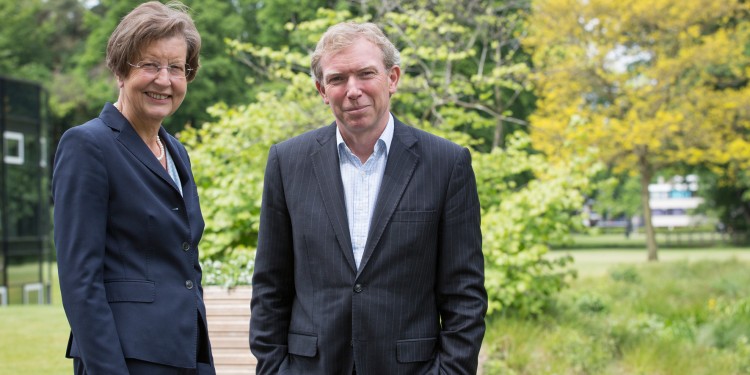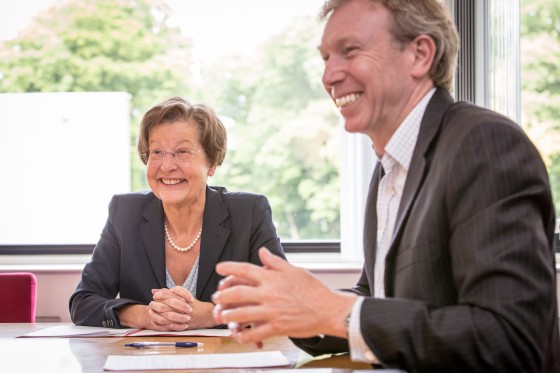
Removing the virtual border
The universities of Münster and Twente have been collaborating since 1979, but in their search for common research funding they still have to deal with the border that lies between them. "We don’t very easily find programmes that are suitable for cross-border collaboration." By extending the network to Groningen and Oldenburg, chairmen Ursula Nelles and Victor van der Chijs hope to remove that 'virtual border'.
"We love each other very much", laughs University of Twente (UT) chairman Victor van der Chijs when asked how close the ties are between his university and the Westfälische Wilhelms-Universität Münster (WWU). "So that’s the good news", smiles rector Ursula Nelles. Both universities have been collaborating since 1979 in many ways: from research programmes to joint degrees and exchange students. Their relationship might be close, but both partners may not see each other for months. No problem at all, in their opinion. The UT-WWU collaboration is not about two chairmen, it’s about the (academic) staff. Van der Chijs: "The cooperation has always been driven bottom-up. Imposing collaboration in the academic world doesn’t work. Let scientists decide whether and how they want to collaborate. That’s a natural process, and it’s growing. Sometimes slowly, even if you wish it would go faster, but definitely steadily."
"Scientists don’t necessarily do what they are told. You’d better make it attractive to them rather than push them", is how Van der Chijs explains the bottom-up strategy. The boards should only have encouraging and supporting roles. Nelles illustrates it with a German saying. "Man kann leichter einen Sack Flöhe hüten als einen Sack voller Wissenschaftler. It’s easier to tend a sack full of fleas than a sack full of scientists."
Benefits

International Network
Since both universities are in the process of further internationalisation, Nelles and Van der Chijs think they could also benefit from each other’s networks. WWU has close ties with several Brazilian universities and could very well introduce the UT in Brazil. Conversely, why shouldn’t Münster use the UT connections in Africa and Indonesia, for example? Nelles: "From an external perspective Europe is a very small continent. I could imagine that we could – just as a vision – look at China together. The Chinese look very carefully for the best European universities to have as their partners. If we could offer them a double package, that could be very strategic."
Border in Mind
Of course both universities see many more opportunities in the cooperation. "There is a lot more to do", says Van der Chijs. "For example, in the field of support staff. There we have hardly done anything together. Obviously, we can learn a lot from each other’s best practices. It makes sense to visit each other to see how things are being done, and to benefit from it."
According to Nelles, it’s important to keep in mind that there are no limitations in working together. However, there is a challenge nonetheless, she admits: "The border in the mind." That political boundary makes it complicated to get funding for joint research proposals, as the national research organisations, German Research Foundation (DFG) and Netherlands Organisation for Scientific Research (NWO), are not oriented towards cross-border consortia. "We don’t find programmes suitable for cross-border collaboration very easily. This makes it difficult for the researchers because they have to try to obtain grants for research programmes that are divided up between the German and the Dutch programme."
As always, there’s also another side of that coin, she adds. ‘There is no reason to compete with Twente just because of this virtual border. Being neighbours competing for the same national funds might be more difficult than being neighbours and having to find one’s own path towards grants.’
"Twente offers what Münster doesn't have and vice versa."
Van der Chijs adds that in Europe, collaboration is an advantage as well. "If we submit a proposal to the EU for the Horizon 2020 programme, our transnational character will put it a step ahead."
Large Square
To make it easier to cross the Münster-Twente border, Nelles is launching a plan to build a network of collaboration in the region, starting with the square Twente – Groningen – Oldenburg - Münster. "So we have two 'Euregios' with two different sources of probable funding." In a later stage Wageningen, Nijmegen and Dortmund could also be part of the new network, and even Maastricht and Aachen, to make the collaboration even more powerful when applying for research funding . Although the first meeting with Oldenburg and Groningen had yet to be scheduled when Nelles launched this plan just before summer, she seems ambitious about the timing. "My term of office ends in September 2016. By that time I want to have fixed the square", says Nelles, who has good contacts with Oldenburg. "I will keep that in mind", Van der Chijs smiles, realising that only one year is left. He continues: "We already have a close tie with Groningen and Nijmegen. The square will be established, it’s just a matter of time."
Authors: Paul de Kuyper and Peter Wichman
